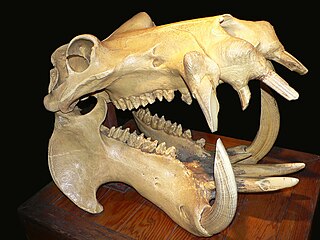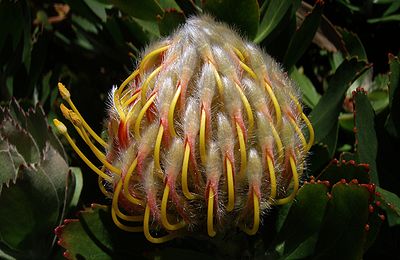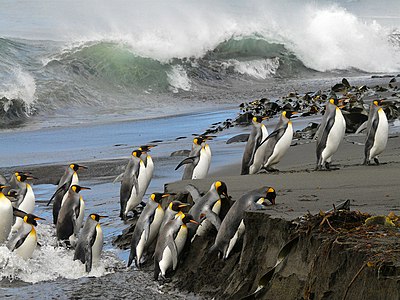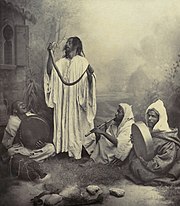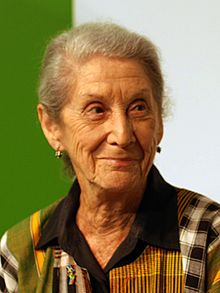Portal:Africa



Africa is the world's second-largest and second-most populous continent after Asia. At about 30.3 million km2 (11.7 million square miles) including adjacent islands, it covers 20% of Earth's land area and 6% of its total surface area. With nearly 1.4 billion people as of 2021, it accounts for about 18% of the world's human population. Africa's population is the youngest among all the continents; the median age in 2012 was 19.7, when the worldwide median age was 30.4. Based on 2024 projections, Africa's population will reach 3.8 billion people by 2099. Africa is the least wealthy inhabited continent per capita and second-least wealthy by total wealth, ahead of Oceania. Scholars have attributed this to different factors including geography, climate, corruption, colonialism, the Cold War, and neocolonialism. Despite this low concentration of wealth, recent economic expansion and a large and young population make Africa an important economic market in the broader global context. Africa has a large quantity of natural resources and food resources, including diamonds, sugar, salt, gold, iron, cobalt, uranium, copper, bauxite, silver, petroleum, natural gas, cocoa beans, and.
Africa straddles the equator and the prime meridian. It is the only continent to stretch from the northern temperate to the southern temperate zones. The majority of the continent and its countries are in the Northern Hemisphere, with a substantial portion and a number of countries in the Southern Hemisphere. Most of the continent lies in the tropics, except for a large part of Western Sahara, Algeria, Libya and Egypt, the northern tip of Mauritania, and the entire territories of Morocco and Tunisia, which in turn are located above the tropic of Cancer, in the northern temperate zone. In the other extreme of the continent, southern Namibia, southern Botswana, great parts of South Africa, the entire territories of Lesotho and Eswatini and the southern tips of Mozambique and Madagascar are located below the tropic of Capricorn, in the southern temperate zone.
Africa is highly biodiverse; it is the continent with the largest number of megafauna species, as it was least affected by the extinction of the Pleistocene megafauna. However, Africa also is heavily affected by a wide range of environmental issues, including desertification, deforestation, water scarcity, and pollution. These entrenched environmental concerns are expected to worsen as climate change impacts Africa. The UN Intergovernmental Panel on Climate Change has identified Africa as the continent most vulnerable to climate change.
The history of Africa is long, complex, and varied, and has often been under-appreciated by the global historical community. In African societies the oral word is revered, and they have generally recorded their history via oral tradition, which has led anthropologists to term them oral civilisations, contrasted with literate civilisations which pride the written word. During the colonial period, oral sources were deprecated by European historians, which gave them the impression Africa had no recorded history. African historiography became organized at the academic level in the mid-20th century, and saw a movement towards utilising oral sources in a multidisciplinary approach, culminating in the General History of Africa, edited by specialists from across the continent. (Full article...)
Selected article –
The Sahara (/səˈhɑːrə/, /səˈhærə/) is a desert spanning across North Africa. With an area of 9,200,000 square kilometres (3,600,000 sq mi), it is the largest hot desert in the world and the third-largest desert overall, smaller only than the deserts of Antarctica and the northern Arctic.
The name "Sahara" is derived from Arabic: صَحَارَى, romanized: ṣaḥārā /sˤaħaːraː/, a broken plural form of ṣaḥrā' (صَحْرَاء /sˤaħraːʔ/), meaning "desert". (Full article...)
Featured pictures –
Did you know (auto-generated) -

- ... that when the pastor of an African-American church bought the El Dorado, one newspaper wrote that "its occupants are white, and were white"?
- ... that opera singer Charles Holland spent much of his career in Europe as opportunities in classical music for African Americans were limited?
- ... that South African mayor Marlene van Staden was re-elected through a coin toss?
- ... that the son of an engine fitter from England became Director of Education in part of modern-day South Africa for almost twenty years?
- ... that Erick Russell is the first openly gay African American elected to a statewide office in the United States?
- ... that weightlifter Oun Yao-ling was asked to compete in the South African Games, but the invitation was swiftly rescinded once the organisers learned that he was Chinese, not white?
Categories
Selected biography –
Nadine Gordimer (20 November 1923 – 13 July 2014) was a South African writer and political activist. She received the Nobel Prize in Literature in 1991, recognised as a writer "who through her magnificent epic writing has ... been of very great benefit to humanity".
Gordimer was one of the most honored female writers of her generation. She received the Booker Prize for The Conservationist, and the Central News Agency Literary Award for The Conservationist, Burger's Daughter and July's People. (Full article...)
Selected country –
 |
 |
|

| ||
Equatorial Guinea, officially the Republic of Equatorial Guinea, is a country in Central Africa. One of the smallest countries in continental Africa, Equatorial Guinea comprises a mainland territory known as Río Muni (including several offshore islands), the island of Bioko (formerly Fernando Pó), where the capital Malabo (formerly Santa Isabel) is located, and the island of Annobón in the South Atlantic Ocean. It is bordered by Cameroon on the north, Gabon on the south and east, and the Gulf of Guinea on the west, where the island nation of São Tomé and Príncipe is located.
Formerly the Spanish colony of Spanish Guinea, its post-independence name is suggestive of its location near both the equator and the Gulf of Guinea. It is the only country in mainland Africa where Spanish is an official language, excluding the Spanish exclaves of Ceuta and Melilla, and the UN-recognised but Moroccan-occupied Sahrawi Arab Democratic Republic (Western Sahara). The discovery of sizeable petroleum reserves in recent years is altering the economic and political status of the country. (Read more...)
Selected city –

Juba (/ˈdʒuːbə/) is the capital and largest city of South Sudan. The city is situated on the White Nile and also serves as the capital of the Central Equatoria State. It is the most recently declared national capital and had a population of 525,953 in 2017. It has an area of 52 km2 (20 sq mi), with the metropolitan area covering 336 km2 (130 sq mi).
Juba was established in 1920–21 by the Church Missionary Society (CMS) in a small Bari village, also called Juba. The city was made as the capital of Mongalla Province in the late 1920s. The growth of the town accelerated following the signing of the Comprehensive Peace Agreement in 2005, which made Juba the capital of the Autonomous Government of Southern Sudan. Juba became the capital of South Sudan in 2011 after its independence, but influential parties wanted Ramciel to be the capital. The government announced the move of the capital to Ramciel, but it is yet to occur. (Full article...)
In the news
- 12 February 2024 –
- Two boats collide on the Congo River near Kinshasa, Democratic Republic of the Congo; with the death toll remains unclear. (AP)
- 11 February 2024 – 2023 Africa Cup of Nations
- In association football, hosts Ivory Coast win their third Africa Cup of Nations by defeating Nigeria 2–1 in the final. Sébastien Haller scores the winning goal in the 81st minute. (The Guardian)
- 10 February 2024 – Somali civil war
- Four Emirati soldiers and a Bahraini military officer are killed, while ten other people are injured, when a soldier opens fire at a military base in Mogadishu, Somalia, before being killed in the ensuing shootout. Al-Shabaab claims responsibility. (AP)
- 10 February 2024 –
- A Eurocopter EC130 helicopter crashes near Nipton, California, United States, killing all the six people on board, including Nigerian banker Herbert Wigwe. (CBS News)
- 10 February 2024 – 2023–2024 Senegalese protests
- Violent protests occur in Senegal following an announcement by President Macky Sall that presidential elections have been delayed from February 25 to December 15. (Sky News)
- 9 February 2024 –
- At least 18 people are killed during a collision between a bus and a truck on a road in Kinshasa, Democratic Republic of the Congo. (AP)
Updated: 16:33, 14 February 2024
General images -
Africa topics
More did you know –
- ...that members of the Senegalese rap group Daara J were hired by campaigners in the Senegalese election of 2000 to edit their speeches?
- ...that Senegalese hip hop group Positive Black Soul's name abbreviation, PBS, is a play on that of the Parti Démocratique Sénégalais, PDS?
- ...that Mamadou Diabaté, a Malian kora player, was nominated for a Grammy Award in 2005, but lost to his cousin Toumani Diabaté?
- ...that, in November 2007, The Sowetan published an article which erroneously claimed that South African political activist Dan Mokonyane had died?
Related portals
Major Religions in Africa
North Africa
West Africa
Central Africa
East Africa
Southern Africa
Associated Wikimedia
The following Wikimedia Foundation sister projects provide more on this subject:
-
Commons
Free media repository -
Wikibooks
Free textbooks and manuals -
Wikidata
Free knowledge base -
Wikinews
Free-content news -
Wikiquote
Collection of quotations -
Wikisource
Free-content library -
Wikispecies
Directory of species -
Wikiversity
Free learning tools -
Wikivoyage
Free travel guide -
Wiktionary
Dictionary and thesaurus



